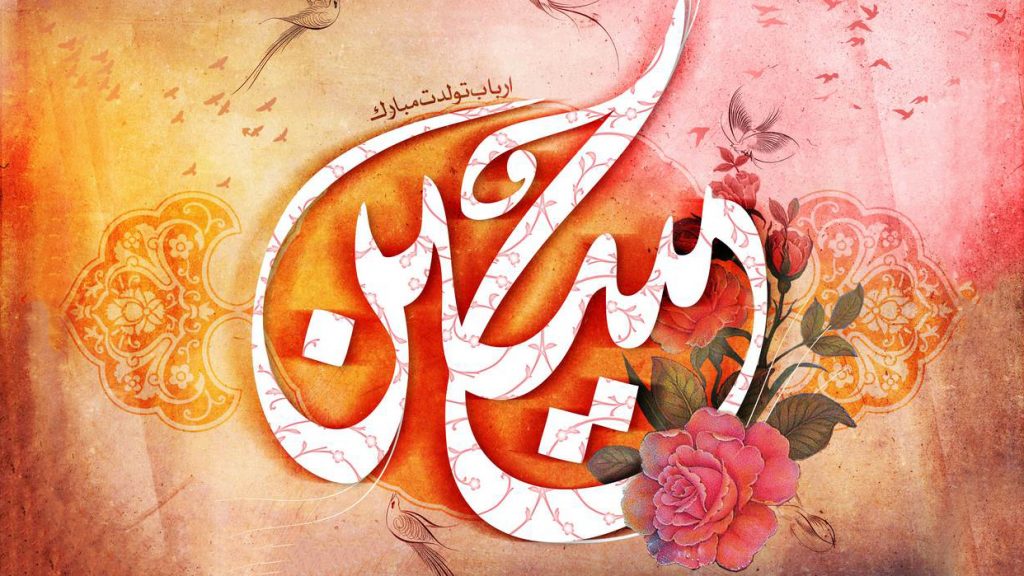Hassan and Hussain (PBUT) were the heirs of scientific, spiritual and physical perfections of the Prophet Muhammad (PBUH&HP). (1) The people could recognize the Prophet in their faces, behavior and manners, and witnessed his greatness and holiness in them. According to the narrations of historythe Prophet was the source of love, kindness, caress, and paternal mercy to the Hassanain (PBUT). He loved them(2), kissed them(3), gave them ride on his shoulders(4), personally nursed them, called them his sons, became upset when they cried(5), and laid them asleep on his chest.
As well, in outdoors, in the house, in the mosque, in the presence of the companions and people, in the times of making speeches, and during the Salat, the Hassanain (PBUT) received the special grace of the Prophet. All the scripts in the authentic books of the Shias and the Sunnis reflect such pure feeling of the Prophet. Apart from such encounters, there are words retold from the Prophet that reveals the special attention of the Prophet towards these Imams (PBUT).
For instance, based on numerous narrations of valid books, Lady Fatimah (PBUH) took Hassan and Hussain to his bed-side during the illness of her father (which leaded in his death), and said: “O the Prophet of God, here are your two sons, bestow them or make them inherit something.”
The Prophet said: “I bestow greatness and patience to Hassan, and kindness and munificence to Hussain.”
And in another narration he said: “So for Hassan, my greatness and courteousness is for him, then for Hussain, he has my munificence and courage.(6)
These narrations reflect a glimpse of the perfection that Imam Hassan and Imam Hussain (PBUT) inherited from their grandfather. These statements and special behaviors toward the Hassan, Hussain and Lady Zahra (PBUT) show the intense feelings of fatherhood. As well, it should be noted that the motives of the Prophet of Allah enjoy balance, and household relationships and his love toward the Hassanain never made him say anything beyond the truth. Therefore these encounters are evidence to the perfections, merits, and efficiencies of the Hassanain and their infallible mother (PBUT). In addition, merely fatherly emotions can not be the source of such statements of the Prophet about them. It is obvious that the Prophet discerned a divine secret in their visages.
Possibly, the secret of such various and similar hints from the Prophet points to the manner of the two great Imams in leadership, that the Prophet has stressed and approved both of them to ensure that the basis of these religious appointments are the plans and duties that the Prophet had announced the people following the divine revelation and that they are not separate from the method and Sirah of the Great Prophet (PBUH&HP). However, Hassan and Hussain (PBUT) are heirs of entire moral and scientific perfections of their grandfather, as the Prophet has said about them:
“These two of my sons are Imams, whether they rise or they sit.”(7)
Moreover, narrations like the noble narration of Thaqalayn, the Imams’ narrations, and the narration of the ship (Safinah), and others indicate that Hassan and Hussain (PBUT) were heirs of the sciences of the Prophet, and each of them were true leaders of Islamic Ummah in their time.
Imam, heir, and successor of the Prophet must be a measure of balance, and is in fact the center which the sluggish and the slow are lead to, so that they are not left, and their distance with Imam, who is the leader of the God worshippers, does not exceed. And the center which the hardliners are returned to, so that excess does not endanger them to get lost. This is the true meaning of some narrations of the Prophet (PBUH&HP) explaining the narration of Thaqalayn.
“Do not accelerate the Quran and Itrah (Ahl al-Bayt (PBUT)) or you will fall, and do not fall behind them or you will fall, and don’t teach Itrah, as they are wiser than you.”(8)
How do we act today? It is possible that through times we get distant from the line of balance; however, the affairs which are conducted away from going to extremes are acceptable by us all. However how can we define the extremes and the moderateness? Who do we consider as the measure of balance in our life?
(Taken from the book “A Ray of the Greatness of Imam Hussain (PBUH)”, by Ayatollah Saafi Golpaygani, with some changes)
The Roshd Website congratulates all Muslims, especially you dear friend, upon the 3rd of Sha’ban, the birthday anniversary of the master of the martyrs and the leader of freemen, Imam Hussain ibn Ali (PBUH).
Footnotes:
1. Regarding his apparent similarity: Sahih Bukhari, vol. 2, p. 188 – Osd al-Ghabah, vol. 2, p. 20
2. Al-Isti’aab, vol. 1, p. 368 – Noor al-Absar p. 104 – Al-Sirah al-Nabawiah, vol. 3, p. 368
3. Sunan ibn Majah, vol. 1, p. 65 – Masaabih al-Sunnah, vol. 2, p. 281 – Tirmadhi, vol. 13, p. 195 and 196
4. Tirmadhi, vol. 13, p. 198 and 199 – Nadhm Durar al-Simtain, p. 212 – Sawa’iq al-Muhraqah p. 135
5. Zakha’ir al-Uqba, p. 143 – Noor al-Absar, p. 114
6. Bihar al-Anwar, p. 44, 16
7. Sawa’iq al-Muhraqah p. 148
8. Sawa’iq al-Muhraqah p. 189 – Nadhm Durar al-Simtain, p. 212 – al-Isabah, vol. 4, pp. 316-418 – Zakha’ir al-Uqba, p. 129 – Kifayah al-Talab p. 227


